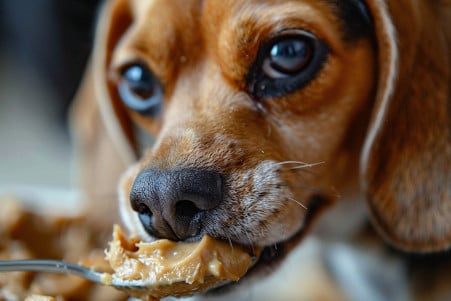Can Dogs Eat Peanuts? Safe Snacking for Your Canine
26 January 2024 • Updated 28 January 2024

Peanuts are a popular snack, but can we share this treat with our furry friends? The answer is yes, dogs can eat peanuts, but there are some important caveats. Make sure to only feed your dog unsalted, dry-roasted, or raw peanuts that have been shelled to avoid a choking hazard. Also, make sure to feed them in moderation because peanuts are high in fat, which can cause pancreatitis and obesity in dogs.
This article will cover expert opinions and nutritional facts to give you a comprehensive understanding of the potential benefits and risks of feeding peanuts to dogs. We’ll cover how the nutritional content of peanuts compares to what dogs need in their diet, the likelihood of dogs having an allergic reaction to peanuts, and the importance of how peanuts are prepared.
After reading this article, you’ll have the information you need to decide whether or not to feed your dog peanuts.
Can dogs eat peanuts?
Peanuts: A Nutrient-Rich Snack for Dogs
Peanuts are nutrient-rich, with a nutritional profile that includes protein, healthy fats, and essential vitamins and minerals. According to Healthline, peanuts are especially high in protein, with levels similar to meat, making them a great plant-based protein source.
This is good news for dogs, who need protein to help their bodies repair and build tissues. Peanuts are also a good source of monounsaturated and polyunsaturated fats, which are good for the heart.
That said, because peanuts are high in fat, it’s important to feed them to your dog in moderation. According to PetMD, while fats are an important source of energy, they can lead to weight gain and other health problems if they’re consumed in excess.
As a study in PMC notes, peanuts are also a good source of B vitamins, vitamin E, and minerals like magnesium and phosphorus, all of which play important roles in a dog’s body. However, the high fat content in peanuts—about 50% monounsaturated and 33% polyunsaturated fatty acids—means that they need to be fed to dogs in moderation to avoid the risk of pancreatitis and obesity.
Feeding your dog peanuts can be a good way to help them get the nutrients they need, but it’s important to make sure you’re taking their individual health and dietary needs into account and that you’re feeding them a well-rounded diet that includes peanuts as just one part.
While you’re considering the potential benefits of feeding your dog peanuts, it’s also important to think about the potential downsides, including the possibility of allergies, which we’ll discuss in more detail below.
How to Spot and Treat Peanut Allergies in Dogs
Like humans, dogs can develop food allergies when their immune systems mistakenly identify proteins in certain foods, including peanuts, as harmful.
According to the Purina Institute, these allergies are often the result of prolonged exposure to the allergen and can cause both dermatological and gastrointestinal issues.
Dermatological symptoms can include anything from non-seasonal itching to recurring skin infections, while gastrointestinal symptoms can include diarrhea and changes in bowel movements. While peanut allergies are less common than allergies to other food allergens like beef or dairy, the Merck Veterinary Manual says they can still cause a lot of discomfort and health issues in dogs.
The prevalence of food allergies in dogs is hard to pin down, but the Merck Veterinary Manual estimates that 1–2% of dogs have food allergies, a number that goes up when the allergies are specifically related to dermatitis or pruritus.
A diet elimination trial is considered the gold standard for diagnosing a suspected peanut allergy, according to the Purina Institute. This involves feeding the dog a novel or hydrolyzed protein diet for several weeks and seeing if the symptoms improve.
After a diagnosis is made, the most common way to manage the allergy is to avoid the allergen for the rest of the dog’s life, with the help of a vet.
If your dog is showing signs of an allergic reaction after eating peanuts, it’s important to talk to your vet to figure out the best way to move forward. With their help and careful dietary management, you can make sure your dog stays healthy and happy.
How to Choose the Best Peanut Products for Your Dog
Not all peanut products are safe for dogs. The American Kennel Club recommends that the best peanuts for dogs are dry-roasted or raw and unsalted. The Merck Veterinary Manual warns that salted peanuts can cause sodium toxicity in dogs, who are more susceptible to the effects of high sodium levels.
Peanut butter can be a healthy treat for dogs if it doesn’t contain xylitol or other toxic ingredients. Xylitol, a sugar substitute used in some peanut butter brands, is extremely poisonous to dogs and can cause serious health problems. To ensure that the peanut butter you give your dog is safe, you may want to make your own at home.
When you’re ready to start feeding your dog peanuts, do so gradually. Wagwalking recommends starting with a small amount, such as 4 to 5 peanuts, a few times a week. Be sure to remove the shells to prevent choking and monitor your dog for any signs of an allergic reaction. If you follow these guidelines, peanuts can be a safe and healthy occasional treat that can help keep your dog’s diet interesting.
Expert Opinions on Dogs and Peanuts
Veterinary professionals share valuable insights on the topic of feeding peanuts to dogs. Dr. Claudine Sievert, a board-certified veterinary nutritionist, says that unsalted, dry-roasted peanuts are safe for dogs to eat.
However, she notes that because of their high fat content, they should only be given to dogs in moderation since they can cause health problems like vomiting and diarrhea. Dr. Michelle Burch warns that raw peanuts can contain aflatoxin, a fungus that can cause sudden liver failure in dogs, so it’s best to stick with dry-roasted peanuts to avoid this risk.
Veterinarians also caution against feeding peanuts to dogs with certain health conditions. For example, According to WebMD, dogs with heart or kidney disease, dogs on special diets, and overweight dogs should not eat peanuts unless a veterinarian says it’s OK. Potential long-term health problems, including pancreatitis and obesity, can result from feeding dogs peanuts regularly because of their high fat content.
Veterinary professionals agree that pet owners should talk to their vet before giving their dog peanuts. This will help ensure that any dietary changes are in line with a dog’s specific nutritional needs and health concerns. In general, it’s best to err on the side of caution and feed peanuts to dogs in moderation, offering them as an occasional treat rather than a regular part of their diet.
Conclusion: The Peanut Proposal for Pups
So, after diving into the topic of dogs and peanuts, it seems that the answer is yes, you can feed your dog peanuts as a healthy snack. However, as WebMD notes, peanuts are nutrient-dense and should make up no more than 10% of your dog’s daily caloric intake. The best options are plain, unsalted, dry-roasted, or raw peanuts, which will help you avoid the high sodium and dangerous additives like xylitol that PetMD warns against.
The bottom line is that you should use peanuts as a treat and, as both Dr. Claudine Sievert and Dr. Michelle Burch suggest, feed them to your dog sparingly to avoid stomach upset and pancreatitis. You should also be sure to watch for signs of an allergic reaction, although as we learned, peanut allergies in dogs are rare.
As always, you should talk to your vet before adding peanuts to your dog’s diet, especially if your dog has any health issues or dietary restrictions. Part of being a good pet parent is making sure that any treat, including peanuts, is safe for your dog to eat.
After all, our pets’ health is the most important thing, and when it comes to peanuts, a little bit can help ensure that your dog stays happy and healthy.


